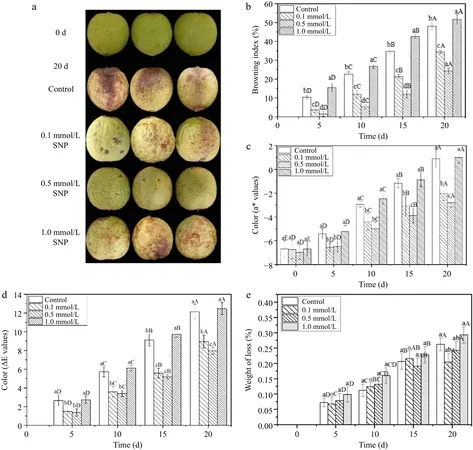
Revolutionary Nitric Oxide Treatment Extends Fresh Walnut Shelf Life and Quality!
2024-11-04
Author: Daniel
Introduction
In a groundbreaking discovery, recent research has found that sodium nitroprusside (SNP) treatment can significantly curb decay and preserve the quality of fresh walnuts. This innovative technique not only enhances the nuts' appearance but also boosts their resistance to diseases, offering a practical and promising solution for increasing the shelf life of this highly sought-after snack.
The Challenge of Preserving Fresh Walnuts
Fresh walnuts are renowned for their delicious flavor, crispy texture, and rich nutritional profile. However, their high moisture content renders them susceptible to rapid decay and browning when stored. Traditional preservation techniques, such as irradiation and modified atmosphere packaging, while somewhat effective, often lack the simplicity required for widespread agricultural use.
Sodium Nitroprusside: A Revolutionary Approach
The treatment with nitric oxide, a known signaling molecule, has previously displayed impressive results in improving stress tolerance in various fruits and vegetables, but it is now being unveiled as a revolutionary technique in walnut preservation. This study is the first of its kind focused on applying SNP to maintain the freshness and reduce spoilage in fresh walnuts.
Research Findings
Published in the journal Food Innovation and Advances, the research aimed to provide walnut producers with tools to mitigate decay, cut waste, and improve overall storage conditions. The team tested various concentrations of SNP, observing changes in walnut appearance, color, and decay rates over 20 days. The standout concentration of 0.5 mmol/L SNP was found to be optimal, resulting in walnuts that resembled freshly harvested produce with a remarkable 59.7% reduction in decay and 31.3% less browning compared to untreated nuts.
Benefits of SNP Treatment
Not only did this concentration preserve the nuts' vibrant green color and smooth texture, but it also activated beneficial disease-related enzymes like chitinase and β-1,3-glucanase that fend off fungal attacks. Furthermore, walnuts treated with lower concentrations of SNP still exhibited lowered decay rates, affirming the treatment's effectiveness.
Mechanisms of Action
Crucially, SNP treatment was shown to suppress ethylene production and slow down respiratory metabolism, effectively delaying fruit ripening and maturation. At 0.5 mmol/L, the respiratory function was reduced by 14%, significantly extending the nuts’ freshness. The treatment also led to a reduction in reactive oxygen species (ROS) while enhancing key antioxidant enzyme activities—factors that contribute to maintaining optimal walnut quality during storage.
Consumer Sensory Evaluations
Consumer sensory evaluations revealed that walnuts treated with SNP had a superior taste, aroma, and crispness, alongside a notable decrease in rancidity. This indicates that utilizing SNP at the right concentrations can effectively ensure high-quality fresh walnuts are preserved during storage.
Expert Commentary
According to the lead researcher, Dr. Liping Qiao, “Our findings demonstrate that SNP treatment, especially at 0.5 mmol/L, can drastically lessen decay, manage oxidative stress, and enhance walnut quality over time. This method is not only economically viable but also environmentally friendly.
Future Prospects
This innovative nitric oxide-based approach holds the potential to revolutionize storage practices for walnuts and similar perishable crops, promoting sustainable agricultural techniques and minimizing resource waste. Although this study opens the doors for further exploration, more research is essential to adapt and optimize SNP usage across different walnut varieties and storage conditions.
Future research could also focus on integrating SNP with other preservation methods to enhance efficacy further. While there may be hurdles in applying this technique on a larger scale in industrial settings, its cost-effectiveness and straightforward application make it a promising prospect for the food industry. Prepare for a walnut preservation revolution—this method may soon be a game-changer!



 Brasil (PT)
Brasil (PT)
 Canada (EN)
Canada (EN)
 Chile (ES)
Chile (ES)
 España (ES)
España (ES)
 France (FR)
France (FR)
 Hong Kong (EN)
Hong Kong (EN)
 Italia (IT)
Italia (IT)
 日本 (JA)
日本 (JA)
 Magyarország (HU)
Magyarország (HU)
 Norge (NO)
Norge (NO)
 Polska (PL)
Polska (PL)
 Schweiz (DE)
Schweiz (DE)
 Singapore (EN)
Singapore (EN)
 Sverige (SV)
Sverige (SV)
 Suomi (FI)
Suomi (FI)
 Türkiye (TR)
Türkiye (TR)